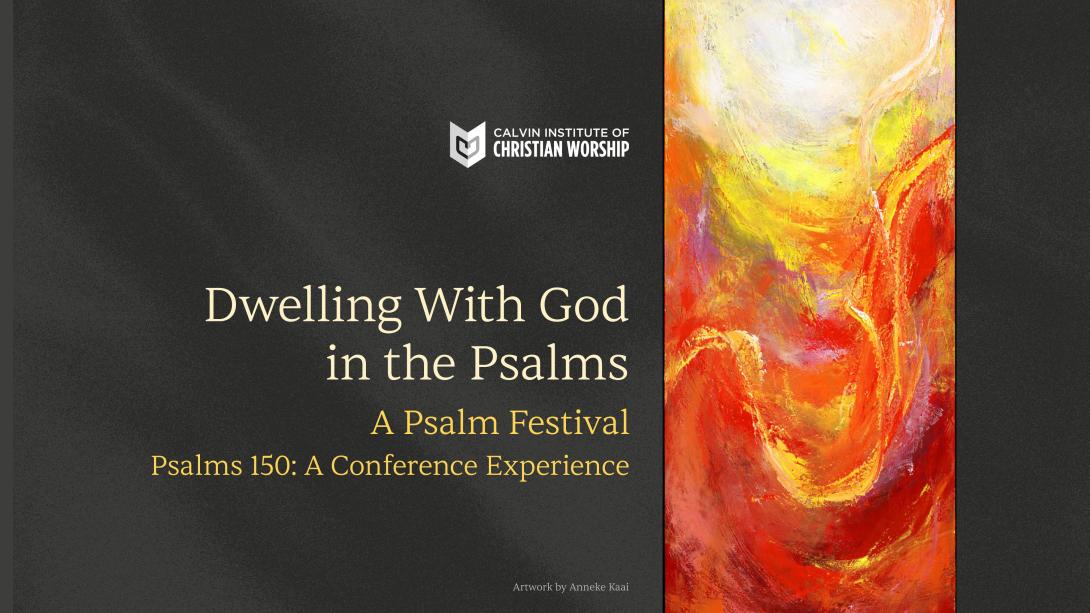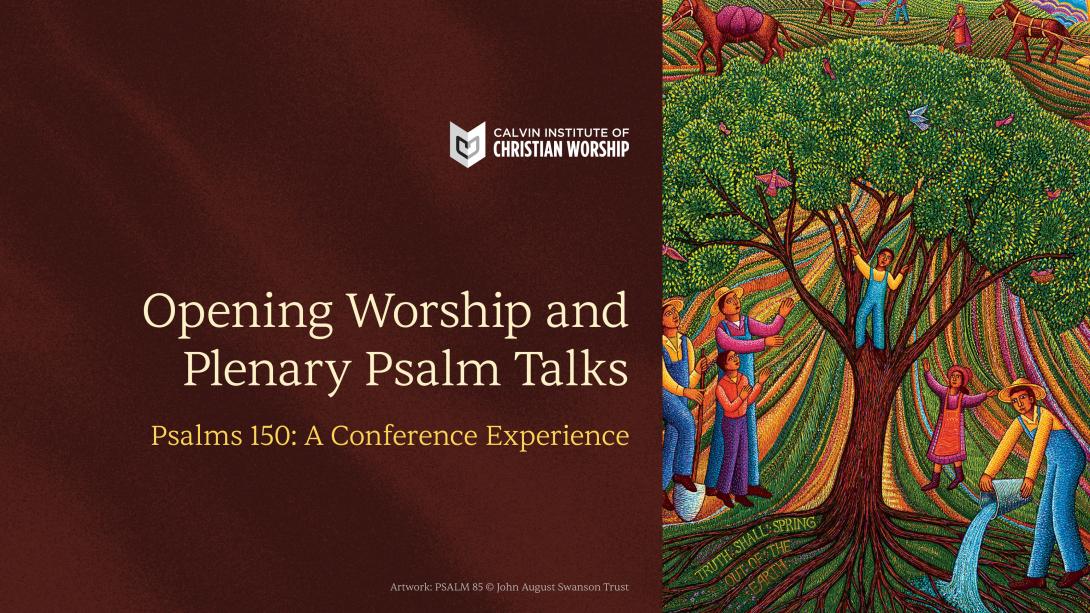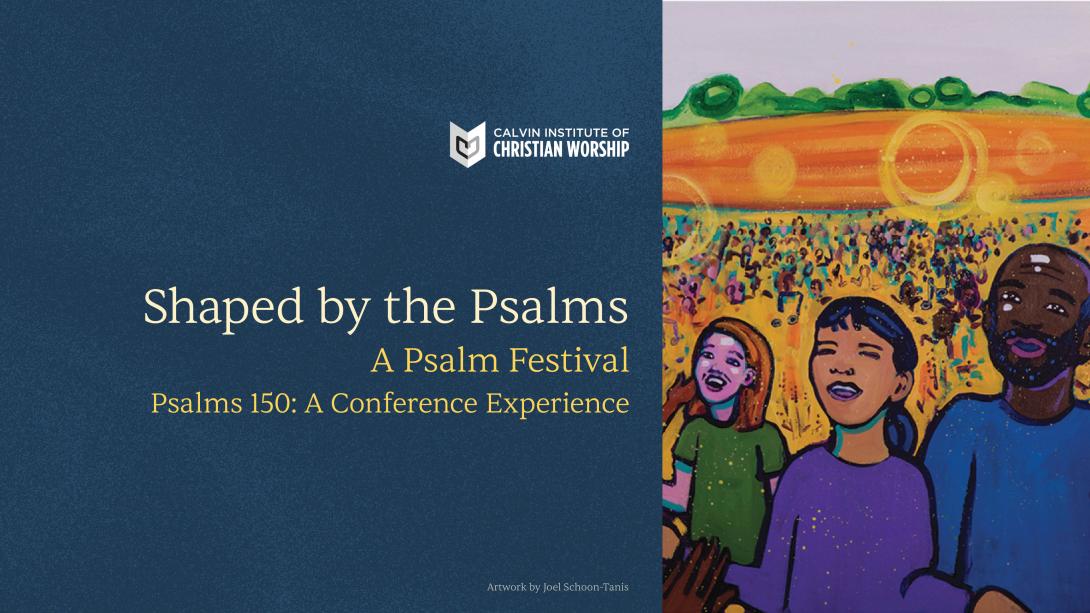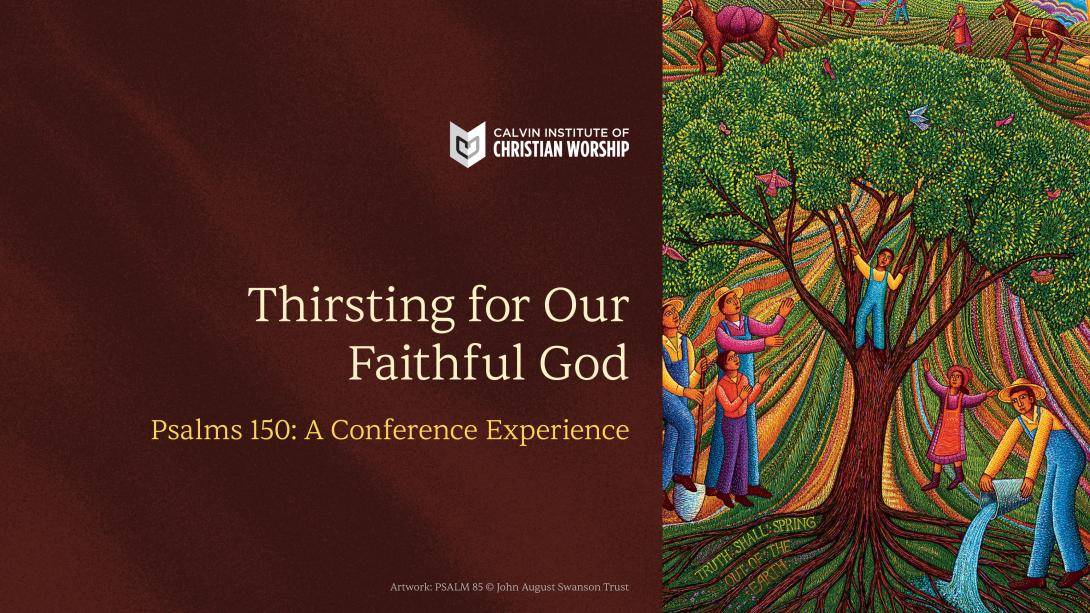Watch this service with the sermon in Arabic:
A worship service from the 2021 online Calvin Symposium on Worship.
Institution Name: Heliopolis Evangelical Church
Participants:
Worship Leaders: Rev. Jan Emile and Mrs. Dina Sobhy
Soloist: Mr. Sameh Robil
Visual Artist: Mrs. Nora Tharwat
Preacher: Mrs. Anne Zaki
Administrator of the Lord's Supper: Rev. Youssef Samir
Location: Cairo, Egypt
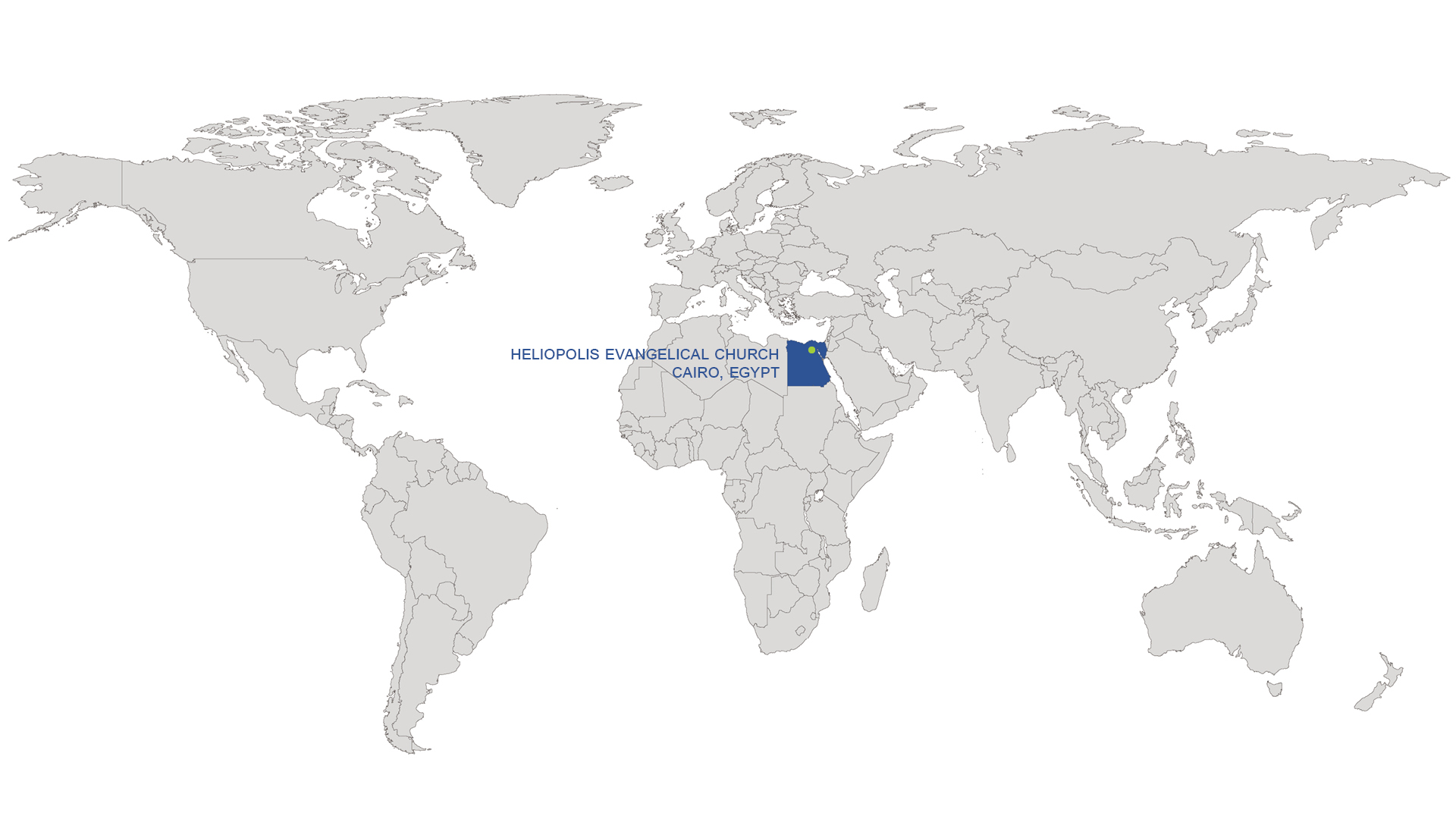
Copyrights:
“Blessed Be the Lord God Almighty”
Text and Music: Bob Fitts © 1984 Universal Music – Brentwood Benson Publishing
Used by permission. CCLI #400063.
“Glorify Thy Name”
Text and Music: Donna Adkins, 1976, © 1976, 1981, Maranatha! Music
Used by permission. CCLI #400063.
“You Deserve the Glory”
Text and Music: Aaron Keyes © 2003 Aaron Keyes
Used by permission. CCLI #400063.
“Draw Me Close to Your Heart”
Words and Music: Unknown, Byong Hak Lee, 2003; tr. Anne Emile Zaki
From Do Your Revival Through Us Songbook
Used by permission.
“How Great Is Our God”
Text and Music: Chris Tomlin, Jesse Reevees, and Ed Cash © 2004 Sixsteps Music, Vamos Publishing, worshiptogether.com, Wondrously Made Songs
Used by permission. CCLI #400063.
“Father I Came to You”
Words: Zakaria Awadallah
Music: Nassef Sobhy
From Sing to the Lord Songbook, 2007
Used by permission.
“You Are the Manna”
Words: Zakaria Awadallah; tr. Anne Emile Zaki
Music: Elia Zakaria
From Songs of the Evangelical Presbyeritan Church of Egypt Hymnal, 2002, Council of Pastoral Work and Evangelism
Used by permission.
“Who Am I?”
Words and Music: Unknown; Byoung Hak Lee, 2003; tr. Anne Emile Zaki
From Do Your Revival Through Us Songbook
Used by permission.
“Just As I Am”
Text: Charlotte Elliott, 1789-1871
Music: William B. Bradbury, 1816-1868
“Father God”
Words and Music: Ian Smale © 2984 Thankyou Music
Used by permission. CCLI #400063.
"Sermon Transcript"
Children of God
A well-known American theologian named Dale Bruner wrote a book about the Holy Spirit several years ago, and he titled his book The Holy Spirit: The Shy Member of the Trinity. In his book Dr. Bruner shows how often the Holy Spirit works silently behind the scenes, rarely pointing to himself but always pointing the person and work of God the Father, and the person and work of God the Son. The shy member of the Trinity.
And while generally I agree with Dr. Bruner’s description of the Holy Spirit, in our text today the Holy Spirit is neither shy nor silent. In fact, he stands, and he speaks boldly and clearly, still not pointing to himself, but pointing to the work of the Father and the work of the Son in us and for us.
How does the Holy Spirit do this? It’s by entering a courtroom scene where he takes the witness stand, and his Spirit bears witness with our spirit.
Would you turn with me to Romans 8:14–17:
“For all who are led by the Spirit of God are children of God. For you did not receive a spirit of slavery to fall back into fear, but you have received a spirit of adoption. When we cry, “Abba! Father!” it is that very Spirit bearing witness with our spirit that we are children of God, and if children, then heirs, heirs of God and joint heirs with Christ—if, in fact, we suffer with him so that we may also be glorified with him.”
This is the Word of the Lord. Thanks be to God.
But you might wonder, why are we in the courtroom in the first place? Who is accusing us? And what is he accusing us of? And why is the Holy Spirit needed to bear witness with our spirit that we are children of God?
Let’s start with the first question: who is accusing us? The one who is accusing us is our enemy, the Evil One. “Like a roaring lion your adversary the devil prowls around, looking for someone to devour (1 Peter 5:8). He is “the accuser of (God’s children), . . . who accuses them day and night before our God” (Rev 12:10). He stands before God and says, “These are the believers?! You call yourselves God’s children when you’re living this way? Look at the way you think, look at the way you talk, look at the way you behave. Tell me, how are you different
- from the children of this world? I don’t see any difference! You dress like them, you shop like them, you date like them; you get angry just like they do, you quarrel with one other and you hold grudges against each other just like the children of the world do; you smile at each other’s face, yet you gossip behind each other’s back; you have the same greed when it comes to money, and the same impurity when it comes to sexuality; you live in the same duplicity, harboring a secret life while polishing a public image. These are your children?”
And it’s not just the accuser that accuses us before God. We ourselves accuse ourselves before God.
A while ago I had a beautiful young lady come and meet with me, and she said, “Anne, you know what, I don’t need an accuser. I got myself covered. I accuse myself by myself. I trap myself in a cycle of guilt and shame day and night.”
And there are many of us here who are trapped in this very cycle of shame, guilt, and self-blame. We’ve listened for so long to the accuser’s words that they’ve become the soundtrack of our lives, and we keep repeating them to ourselves, this destructive self-talk that leaves us trapped in a vicious cycle: waiting, hoping that anyone would come and help us get out. Some of us sit in this unforgiving cycle and think, “I didn’t care for my children enough,” or “I didn’t care for my parents as I should have.” Some of us think, “I drank too much again when I was with friends, or when I was alone, and I know I am going down an addictive path.” Some think, “I lied again! When and how did telling lies become so natural and easy for me?” Some think, “I succumbed to sexual temptation again with my fiancé. When can we get married so I can get rid of this guilty feeling?” Others think, “I lost my temper again. I threw something and broke it again. I hit those whom I love in my home again. Who can help me to be released and relieved from this unforgiving cycle of guilt, shame, and self-blame?”
And over and over again, we find ourselves trapped, desperate for a way out, somebody to come and rescue us from these disgusting and destructive habits.
And between Satan’s accusations of us, and our own accusations of ourselves, we become slaves of fear: fear of ourselves, fear of our past, fear of a certain sin that we just can’t imagine that God could possibly forgive, fear concerning our eternal life. We become slaves to a spirit of fear as our enemy prowls around like a roaring lion, seeking someone to devour into the spirit of slavery.
And for some of us, when life circumstances become difficult, and when trials and sufferings increase, we fear even more, and we tell ourselves a lie, that God’s patience must have run out, and the time of punishment has come. This last transgression against God must have been the straw that broke the camel’s back, and God is now offended, and he will spit us out of his mouth, and he will scream at us, “Get away from me, you evildoers; I never knew you” (Matt. 7:23).
Satan accuses us, and we accuse ourselves, and it’s at that very moment that the Holy Spirit enters the courtroom, and he takes the witness stand, and he says, “They are God’s children. I am here to testify because I am the pledge of their inheritance toward redemption as God’s own people (Eph. 1:14). I am here to testify that they are led by me as children of God (Rom. 8:14). I bear witness that ‘all who received him, who believed in his name, he gave power to become children of God’” (John 1:12).
The Spirit stands at the witness stand, and he says that we have a new identity in Christ. For all who believe in Christ, our identity is now children of God. And this identity of adoption is different from any former identity we once had. It is much more distinguished than simply bearing the image of God with all humanity, male and female, who were created in the image of God. No, this new identity is much more special, much more distinguished. We are not just the image bearers of God, but we are children of God, which is an identity bestowed only on those who united themselves to Christ, those who received Christ as their personal Savior.
The Holy Spirit testifies that he is present with us in our daily battles, day after day, sometimes hour after hour. He’s there with us, leading us from a life enslaved to fear and sin to a life of freedom and holiness in Christ.
The Holy Spirit rises up at the witness stand and declares, “I am the one who helps them every time the struggle with themselves and hate facing their temptations—for ‘I do not do the good I want, but the evil I do not want is what I do’ (Rom. 7:19). I am the one who strengthens them to put to death the works of the flesh. I am the one who counsels them every time they wonder whether they should repent and return to the Father’s embrace, whether they should trust his love and forgiveness again. I am the one who helps them every time they doubt whether the Father will welcome them if they do return, and if he does, will he receive them as beloved children or as humiliated hired hands? I am the one who leads them back, and they submit to my leadership by not setting their mind on the flesh, which is death, but setting their mind on the Spirit, which is life and peace (Rom. 8:6), and that’s why I am the one who calls them peacemakers and blesses them, for they are the children of God” (Matt. 5:9).
The Holy Spirit stands at the witness stand and declares, “There is now no condemnation for those who are in Christ Jesus,” those who live not according to the flesh, “but according to the Spirit” (Rom. 8:1, 5).
In this courtroom scene that we see in this chapter is a fulfillment of a prophecy by the prophet Isaiah in chapter 50. Listen to these words:
He who vindicates me is near.
Who will contend with me?
Let us stand up together.
Who are my adversaries?
Let them confront me.
It is the Lord God who helps me;
who will declare me guilty? (Isa. 50:8–9)
The Holy Spirit bears witness with our spirit that we have received the spirit of adoption, by which we cry “Abba, Father.” And, Paul goes on to say, if we are children of God, then we are “heirs of God” (Rom. 8:17). We are all heirs of God.
But how could that be? Doesn’t the inheritance belong only to the eldest son? Yes, it does. But it is this Eldest Son who chose to share his inheritance with us. Unlike what happened in the parable of the prodigal son, where the older brother refused to share his inheritance with the younger brother because the younger brother had already wasted all of his inheritance. Unlike the older brother in the parable, our eldest brother, Jesus Christ, chooses to share his inheritance with us. Unlike the older brother in the story of the prodigal son, our eldest (brother) Jesus takes joy in heaven every time one sinner comes back to the Father’s household. This is why Paul finishes verse 17 by saying these words: not only are we children of God, not only are we heirs of God, but we are joint heirs with Christ (Rom. 8:17).
We are joint heirs with Christ! This is huge! Do you know what that means? To be joint heirs with Christ means that our inheritance hangs on the inheritance of Jesus. It stands or falls with the inheritance of Jesus. If the inheritance of Jesus is guaranteed, then so is our inheritance. And if the inheritance of Jesus is threatened to demise, then so is our inheritance. But far be it from God the Father to rob Jesus of his full and complete inheritance, for this is the Son, the beloved Son, with whom the Father is well pleased. The inheritance of Jesus is kept safe by his faithful and loving Father. And our own inheritance is kept safe with our eldest brother, our faithful and loving Jesus Christ. “As the Father has loved me,” said Jesus, “so I have loved you” (John 15:9).
Paul also says these words in his letter to the Galatians: “But when the fullness of time had come, God sent his Son, born of a woman, born under the law, in order to redeem those who were under the law, so that we might receive adoption as children. And because you are children, God has sent the Spirit of his Son into our hearts, crying, ‘Abba! Father!’ So you are no longer a slave but a child, and if a child then also an heir” of God, through Christ” (Galatians 4:4–7). We are joint heirs with Christ.
Then we stop to ask: what are we inheriting? What is the inheritance of Jesus that we get to share? The inheritance of Jesus is a terrific glory. Listen to what the Bible says God the Father had given to Jesus: The Bible teaches that God has put all things in subjection under Christ’s feet (1 Cor. 15:27). Thus, when Jesus shares his inheritance with us, he actually richly provides us with everything that God has given for our enjoyment (1 Tim. 6:17). God gave us himself in Jesus Christ, and in turn, Jesus Christ laid down his life and gave us himself in bread and wine, the Lord’s Supper that we’re about to partake in (1 Cor. 11).
Jesus’ inheritance means that God gave us, through Jesus, the Holy Spirit with all his gifts to the church (Joel 2:28–29).
God gave us the hope of the resurrection to an eternal life. This past year many of us lost dear ones because these perishable bodies could not combat the virus, or the disease, or the cancer. But in Jesus we have the hope of the resurrection in unperishable bodies: “Flesh and blood cannot inherit the kingdom of God, nor does the perishable inherit the imperishable. . . . For this perishable body must put on imperishability, and this mortal body must put on immortality” (1 Cor. 15: 50–53).
God gave us in Jesus “an inheritance that is imperishable, undefiled, and unfading, kept in heaven for you” (1 Pet. 1: 4). This is what the Holy Spirit stands to bear witness with our spirit: that we are joint heirs with Christ!
But just like there is a terrific glory in our inheritance with Jesus, there is also terrifying suffering. This is why the last verse Paul wrote here (says): “If, in fact, we suffer with him so that we may also be glorified with him” (Rom. 8:17). Both are tied together—the terrific glory and the terrifying suffering—in the inheritance of Jesus. And the one who refuses one part refuses the whole. The ones who live their lives avoiding suffering should not expect glory! As much as there is a crown, there is also a cross.
I am not talking here about the kind of suffering that results from our wrongdoing, our wrong choices, or the pain the comes from managing our lives on our own according to our own will. No! I am speaking of the kind of suffering that resembles the suffering of Jesus, because this is the inheritance of Jesus.
Let’s reflect for a minute about the suffering of Jesus. Jesus suffered in his life on earth in at least four different ways. Jesus suffered when he fulfilled God’s purposes and God’s will in his life. Jesus experienced great resistance and offense. He faced insult and injustice because he was simply trying to do God’s will. Do you remember what happened to him after his very first sermon? They took him to the edge of a cliff and wanted to push him off. Why? Because he came proclaiming good news—not to the self-righteous, not to the self-sufficient, but good news to the poor. “The Spirit . . . has anointed me to bring good news to the poor. He has sent me to proclaim release to the captives and recovery of sight to the blind, to let the oppressed go free” (Luke 4:18).
Jesus also experienced terrifying suffering with the groans of a creation that suffered the consequences of the Fall and that still suffers the ongoing consequences of our wrong choices. Jesus suffered with a creation that groans while it waits “to be set free from its bondage to decay and (to) obtain the freedom of the glory of the children of God” (Rom. 8:21).
Another way that Jesus experienced this terrifying suffering is when he faced the devil’s temptations in the wilderness. Because remember how the devil attacked him the wilderness? He was attacking Jesus’ very identity as the child of God. “If you are the Son of God . . .” (Matt. 4:3, 6).
And the last way that Jesus suffered this terrifying suffering was ultimately in Gethsemane, on his way to the cross, where he chose to lay down his life for others. And he cried in that garden of Gethsemane, “Abba, Father, . . . remove this cup from me”—the same words that the Spirit enables us to cry, “Abba, Father”— “yet, not what I want, but what you want” (Mark 14:36).
These were the four reasons for Jesus’ suffering on earth. Jesus did not suffer because of wrong choices or because he abandoned the leading of the Holy Spirit. In fact, Jesus suffered because he obeyed the leading of the Holy Spirit, even when the Spirit led him into the wilderness to be tempted. This is the kind of suffering that we inherit as joint heirs with Christ. A terrific glory, yes. But also a terrifying suffering. With Jesus we inherit a crown of thorns.
But do not fear! This terrifying suffering is limited. The suffering we experience on earth because of our inheritance with Jesus is limited. And we are never alone in it. We are never alone. Even when we can’t find the words to express our pain, there is a Spirit who intercedes with groans too deep for words. We are never alone. Even as we suffer, Jesus unites himself with us, with our suffering.
Remember when Jesus appeared to Saul on his way to Damascus in the story of Paul’s conversion? When he shows up to Paul, he introduces himself, saying “I am Jesus, whom you are persecuting” (Acts 9:5). But Saul wasn’t persecuting Jesus; Saul was persecuting men and women like us who chose to follow Jesus. But Jesus so unites himself with his followers, with his younger brothers and sisters, that he says, “You are persecuting me!”
We are never alone, and our suffering on this earth is limited as we compare it to the gift of glory that awaits us. I am encouraged by Paul’s words in Romans 8, in the next verse after our text today: “I consider that the sufferings of this present time are not worth comparing with the glory about to be revealed to us” (Rom. 8:18). Whatever it is that we suffer today for our faith, and whatever pain it is that we face as joint heirs with Christ, could never, ever be compared with the promised glory that’s about to be revealed in us and through us for the salvation of the world.
How then shall we live in response to this amazing gift of adoption and this astounding inheritance through Jesus Christ? Paul concludes with these words in Romans 8:12—he gives us another description: not only are we children of God; not only are we heirs of God; not only are we joint heirs with Christ: “We are debtors, not to the flesh, to live according to the flesh—for if you live according to the flesh, you will die; but if by the Spirit you put to death the deeds of the body, you will live” (Rom. 8:12–13).
We are debtors. But our debt is not that of a slave, but rather that of a grateful, free child, a prodigal child who returned to his father’s embrace only to find love, acceptance, and forgiveness and to find an inheritance still kept for him with his faithful and loving father.
We are indebted with gratitude and thanksgiving, which is the essence of the Christian life. We are compelled to live as ones who’ve been set apart from the children of this world to follow the Spirit’s leading for the sake of God’s name and God’s glory.
At Jesus’ time in the first century, there was a famous saying that was said by Roman citizens, especially when they were in the face of temptation. When somebody comes and tempts them to cheat, or to lie, or to be dishonest, they would stand tall, taking pride in their identity and say, “I am Roman!” As if simply declaring their identity and their citizenship to the kingdom of Rome and to Caesar is reason enough not to fall into temptation. I wonder what it would be like for us—children of God, followers of Christ, in the face of temptation, when the evil one comes and says, “Why not? Try it!” Why not? No one will find out.” “Why not? It’s just you and the darkness.” I wonder what it would be like for us children of God to stand tall, take pride in our identity, in our allegiance to belong to Christ, and say, “No! I am Christian!” Paul says we are debtors. We are compelled to be set apart to live a different life. We are compelled to follow the example of Christ.
He says this in Ephesians 5: “Therefore be imitators of God, as beloved children, and live in love, as Christ loved us and gave himself up for us” (Eph. 5:1–2).
We imitate Christ when we also fulfill God’s purposes in our lives, when we live out God’s will like Jesus lived. We imitate God when we, too, share in the call and anointing of Jesus “to bring good news to the poor . . . to proclaim release to the captives and recovery of sight to the blind, to let the oppressed go free, to proclaim the year of the Lord’s favor” (Luke 4:18–19).
We imitate Christ when we share in his life of holiness and righteousness. In 1 Corinthians we read: “Do you not know that wrongdoers will not inherit the kingdom of God? Do not be deceived! Fornicators, idolaters, adulterers, male prostitutes, sodomites, thieves, the greedy, drunkards, revilers, robbers—none of these will inherit the kingdom of God. And this is what some of you used to be. But you were washed, you were sanctified, you were justified in the name of the Lord Jesus Christ and in the Spirit of our God” (1 Cor. 6:9–11).
Finally, we imitate Christ when we know that our adoption leads to sharing in his suffering, and that sharing in his suffering proves our adoption. When we suffer, it proves our adoption. Paul wrote this in Romans 5: “We also boast in our sufferings, knowing that suffering produces endurance, and endurance produces character, and character produces hope, and hope does not disappoint us, because God’s love has been poured into our hearts through the Holy Spirit that has been given to us” (Rom. 5:3–5).
I will conclude with Paul’s words at the end of chapter 8. As the Holy Spirit stands at the witness stand bearing witness with our spirit that we are children of God, he finally declares.
Who will bring any charge against God’s elect? It is God who justifies. Who is to condemn? It is Christ Jesus, who died, yes, who was raised, who is at the right hand of God, who indeed intercedes for us. Who will separate us from the love of Christ? Will hardship, or distress, or persecution, or famine, or nakedness, or peril, or sword? As it is written, ‘For your sake we are being killed all day long; we are accounted as sheep to be slaughtered.’ No, in all these things we are more than conquerors through him who loved us. For I am convinced that neither death, nor life, nor angels, nor rulers, nor things present, nor things to come, nor powers, nor height, nor depth, nor anything else in all creation, will be able to separate us from the love of God in Christ Jesus our Lord (Rom. 8:33–39).
And the courtroom scene ends with God having the final word in Revelation 12:10: “Now have come the salvation and the power and the kingdom of our God and the authority of his Messiah, for the accuser of our (brothers and sisters) has been thrown down, who accuses them day and night before our God.”
Our accuser has been thrown down, and our Father’s embrace remains open, waiting for us to come and receive our new identity as children of God and joint heirs with Christ. Thanks be to God—Father, Son, and Holy Spirit. Amen.

